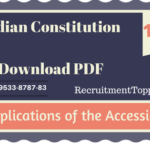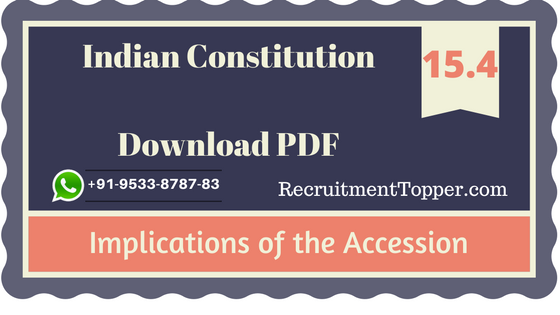Municipalities and Planning Committees | Indian Constitution Download PDF
PART IXA which has come into force on 1-6-1993 gives a constitutional foundation to the local self-government units in urban areas. In fact such institutions are in existence all over the country.
Some of the provisions are similar to those contained in Part IX, e.g. Reservation of Seats, Finance Commission, Election Commission etc.
This part gives birth to two types of bodies:
(i) Institutions of self-government [Art. 243Q], and
(ii) Institutions for planning [Arts. 243ZX and 243 ZE].
Institutions of self-government, called by a general name “municipalities” are of three types:
(a) Nagar Panchayat, for a transitional area, i.e. an area which is being transformed from a rural area to an urban area.
(b) Municipal Council for a smaller urban area.
(c) Municipal Corporation for a larger urban area.
Article 243Q makes it obligatory for every State to constitute such units. But if there is an urban area or part of it where municipal services are being provided or proposed to be provided by an industrial establishment in that area then considering also the size of the area and other factors the Governor may specify it to be an industrial township. For such an area it is not mandatory to constitute a Municipality.
Composition of Muncipalities
The members of a municipality would generally be elected by direct election. The Legislature of a State may by law Municipalities. provide for representation in a municipality of (i) persons having special knowledge or experience in municipal administration, (ii) Members of Lok Sabha, State Assembly, Rajya Sabha and Legislative Council, and (iii) the Chairpersons of Committees constituted under Cl. (5) of Art. 243S. The Chairperson shall be elected in the manner provided by the Legislature.
Wards Committee
For one or more wards comprised within the territorial area of a municipality having a population of three lacs or more it would be obligatory to constitute Ward Committees. The State Legislature shall make provision with respect to its composition, territorial area and the manner in which the seats in a ward committee shall be filled.
Other Committees
It is open for the State Legislature to constitute Committees in addition to the wards committees.
Reservation of seats for scheduled castes and Scheduled Tribes
As in Part IX reservations of seats are to be made in favour of the Scheduled Castes and Scheduled Tribes in every Municipality.
Reservation for women
Out of the total number of seats to be filled by direct elections at least Reservation for I/3rd would be reserved for women. This includes the women. quota for women belonging to Scheduled Castes and Tribes.
Reservation of offices of Chairpersons
It has been left to the State legislature to prescribe by law the manner of reservation of the offices of the Chairpersons of Municipalities.
All reservations in favour of Scheduled Castes and Tribes shall come to an end with the expiry of the period specified in Art. 334.
It is permissible for a State Legislature to make provisions for reservation of seats or offices of Chairpersons in favour of backward classes.
Duration of Municipalities
Every Municipality shall continue for five years from the date of its first meeting. But it may be dissolved earlier according to law. Article 243 further prescribes that before dissolution a reasonable opportunity of being heard must be given to the municipality. Elections to constitute a Municipality shall be completed before the expiry of the period of five years. If the Municipality has been superseded before the expiry of its term, the elections must be completed within six months of its dissolution. A Municipality constituted after its dissolution shall continue only for the remainder of the term. But if the remainder of the period is less than six months it shall not be necessary to hold elections.
It has been provided that no amendment of the law in force shall cause dissolution of a Municipality before the expiry of the five years term.
Qualification for membership
Article 243V lays down that all persons who are qualified to be chosen the State legislature shall be qualified for being a member of a Municipality. There is an important difference. Persons who have attained the age of 21 years will be eligible to be a member. While the constitutional requirement is that for election to the State legislature of a State a person must have attained the age of 25 years [Art. 173].
Powers authority and responsibilities of Muncipalities
Legislatures of States have been conferred the power [Art. 243W] to confer on the Municipalities all such powers and authority as Powers, authority be necessary to enable them to function as institutions self-government. it has specifically been mentioned that they may be given the responsibility of
(a) preparation of plans for economic development and social justice, (b) implementation of schemes as may be entrusted to them, and (c) in regard to matters listed in the 12th schedule. This schedule contains 18 items, e.g. Urban Planning, Regulation of Land Use, Roads and Bridges, Water Supply, Public Health, Fire Services, Urban Forestry, Slums, etc.
Power to impose taxes and financial resources
A State Legislature may by law authorise a Municipality to levy, collect and appropriate taxes, duties, tolls etc. The law may lay down the limits and prescribe the procedure to be followed. It can also assign to a Power to impose Municipality various taxes, duties etc. collected by the State Government. Grants-in-aid may be given to the Municipalities, from the Consolidated Fund of the State.
Panchayat Finance Commission
The Finance Commission appointed under Art. 243-1 shall also review the financial position of the Municipalities and make recommendations as to—
(a) the distribution between the State and the Municipalities of the net proceeds of taxes, duties, tolls and fees leviable by the State which may be divided between them and allocation of shares amongst different levels of Municipalities.
(b) the taxes, duties, tolls and fees that may be assigned to the Municipalities.
(c) grants-in-aid to the Municipalities.
(d) the measures needed to improve the financial position of the Municipalities.
(e) any other matter that may be referred to it by the Governor.
Elections to Muncipalities
The State Election Commission appointed under Art. 243K shall have the power of superintendence, direction and control of (i) preparation of electoral rolls for, and (ii) the conduct of all elections to the Municipalities. State Legislatures have been vested with necessary power to regulate by law all matters relating to elections to Municipalities.
Bar to interface by courts in electoral matters
The courts shall have no jurisdiction to examine the validity of a law, Bar to interference relating to delimitation of constituencies or the by courts in allotment of seats made under Art. 243ZA. An election to a Municipality can be called in question only by an election petition which should be presented to such authority and in such manner as may be prescribed by or under any law made by the State Legislature.
More Resources









